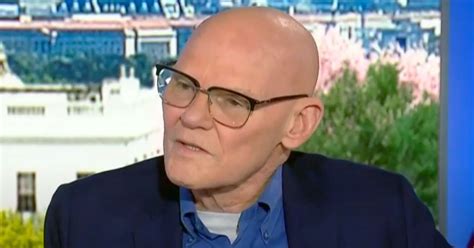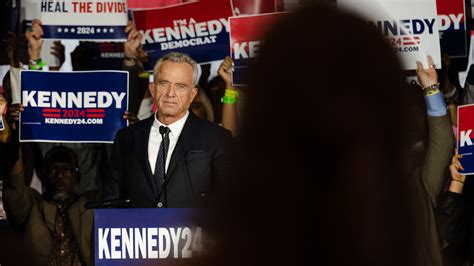
James Carville, a veteran Democratic strategist, has warned that the conspiracy theories surrounding John F. Kennedy Jr.’s supposed return have taken a dangerous and potentially deadly turn, fueled by online radicalization and posing a significant threat to public safety. Carville expressed grave concerns about the increasing intensity and real-world consequences of this fringe belief, stating it could instigate violence, similar to the January 6th Capitol attack, given the fervor and unwavering dedication of its adherents.
Carville, a prominent political commentator, spotlighted the concerning trend that individuals deeply invested in the QAnon-adjacent fantasy that JFK Jr., who died in a plane crash in 1999, will reappear and reinstate Donald Trump as president, have become increasingly emboldened. “This JFK Jr. stuff is going to get somebody killed,” Carville declared on the “Politicon” podcast, underlining his alarm over the escalating rhetoric and potential for real-world harm.
The alarming trend is particularly visible within certain segments of the population who have embraced the QAnon conspiracy movement. These individuals believe that JFK Jr. is not only alive but also poised to return to public life alongside Donald Trump, leading to a dramatic restoration of power. The specific date that many followers had anticipated for this return, August 16, 2023, passed without incident, leading to disappointment among some. However, the unwavering belief in this narrative remains strong among its adherents, and the failed predictions have done little to diminish their conviction.
Carville’s warning serves as a stark reminder of the dangers associated with the spread of misinformation and the potential for such conspiracy theories to incite violence. He emphasized that the intense devotion of these believers and their willingness to take extreme action represent a significant risk to society.
This isn’t the first time Carville has publicly addressed the dangers of political extremism. He has consistently voiced concerns about the impact of misinformation and radicalization on the American political landscape. His latest warning underscores the urgent need to address the spread of conspiracy theories and to mitigate their potential for real-world harm.
The Genesis of the JFK Jr. Conspiracy
The JFK Jr. conspiracy theory, deeply intertwined with QAnon, posits that John F. Kennedy Jr. faked his own death and will reappear to become Donald Trump’s running mate, paving the way for Trump’s return to power and the exposure of a “deep state” cabal. This narrative, born from a mixture of nostalgia, distrust of institutions, and online radicalization, has gained traction among specific groups within the United States.
The roots of this theory can be traced back to the early days of the QAnon movement, where it began as a fringe element. However, over time, it has become a more prominent and widespread belief, particularly among those who feel disenfranchised or distrustful of mainstream media and government institutions.
Central to the JFK Jr. conspiracy is the idea that his death was staged to allow him to operate in the shadows and fight against the supposed “deep state.” Believers often point to perceived inconsistencies in the official reports surrounding his death, using these to support their claims that he is still alive and working behind the scenes.
The connection to QAnon is critical, as the JFK Jr. conspiracy is frequently promoted within QAnon communities and is often presented as part of a broader narrative about a secret war being waged against the “deep state.” QAnon followers believe that Trump was chosen to expose and dismantle this shadowy network and that JFK Jr. will play a crucial role in this effort.
The convergence of these two narratives has created a powerful and potentially dangerous belief system that has significant real-world implications.
The Role of Online Radicalization
Social media platforms and online forums have played a significant role in the spread and amplification of the JFK Jr. conspiracy theory. These platforms provide echo chambers where individuals can reinforce their beliefs, connect with like-minded people, and be exposed to increasingly radical content.
Algorithms on social media platforms often prioritize engagement, which can lead users to be presented with content that confirms their existing beliefs, even if that content is false or misleading. This creates a feedback loop where individuals become increasingly entrenched in their views and less likely to consider alternative perspectives.
Online communities dedicated to the JFK Jr. conspiracy theory provide a space for individuals to share information, discuss their beliefs, and coordinate activities. These communities often promote a sense of belonging and shared purpose, which can further strengthen individuals’ commitment to the conspiracy.
Moreover, the anonymity afforded by the internet can embolden individuals to express more extreme views and engage in more harmful behaviors than they might otherwise. The lack of accountability and the absence of real-world consequences can contribute to the escalation of online radicalization.
Failed Predictions and Unwavering Belief
Despite numerous failed predictions, the belief in the JFK Jr. conspiracy has persisted among its followers. The most notable example of this was the anticipation of his supposed return on August 16, 2023. When this date passed without incident, some followers expressed disappointment and confusion. However, this did not lead to widespread abandonment of the conspiracy.
Instead, many believers simply shifted their expectations and looked for new dates or explanations for why the predicted return had not occurred. Some suggested that the timing was intentionally delayed to throw off the “deep state,” while others argued that the return was still imminent and that they needed to remain patient and vigilant.
This ability to adapt and rationalize failed predictions is a common characteristic of conspiracy theories. Believers often develop elaborate explanations to account for inconsistencies or disconfirming evidence, which allows them to maintain their faith in the conspiracy despite the lack of tangible proof.
The unwavering belief in the JFK Jr. conspiracy, even in the face of repeated failures, highlights the power of cognitive biases and the human tendency to seek out information that confirms existing beliefs. It also underscores the importance of critical thinking skills and the ability to evaluate evidence objectively.
Potential for Violence
Carville’s warning about the potential for violence is based on the observation that individuals who are deeply invested in conspiracy theories can become increasingly radicalized and prone to taking extreme actions. This is particularly true when the conspiracy theory is tied to a broader narrative about a struggle against evil forces.
The JFK Jr. conspiracy, with its claims of a “deep state” and a secret war being waged against it, can create a sense of urgency and a belief that drastic measures are necessary to save the country. This can lead individuals to justify violence as a means of defending themselves and their beliefs.
The January 6th Capitol attack serves as a stark example of the potential consequences of this type of radicalization. Many of the individuals who participated in the attack were motivated by conspiracy theories about the 2020 election and believed that they were acting to prevent the theft of the presidency.
Carville’s concern is that the JFK Jr. conspiracy could similarly inspire individuals to engage in acts of violence, particularly if they believe that they are acting to protect Trump or to bring about the return of JFK Jr. The combination of fervent belief, online radicalization, and a sense of urgency can create a dangerous and unpredictable situation.
Addressing the Threat
Addressing the threat posed by the JFK Jr. conspiracy and other similar movements requires a multi-faceted approach that includes education, media literacy, and law enforcement intervention.
Education is essential to equip individuals with the critical thinking skills necessary to evaluate information objectively and to resist the allure of conspiracy theories. This includes teaching people how to identify logical fallacies, how to assess the credibility of sources, and how to recognize the signs of online radicalization.
Media literacy is also crucial, as it helps people to understand how media messages are constructed and how they can be manipulated. This includes teaching people how to identify bias, how to distinguish between fact and opinion, and how to be aware of the potential for misinformation and disinformation.
Law enforcement has a role to play in monitoring and disrupting online communities that promote violence and extremism. This includes working with social media platforms to remove content that violates their terms of service and investigating individuals who are suspected of plotting or inciting violence.
However, it is also important to avoid overreacting or engaging in censorship, as this can inadvertently reinforce the beliefs of conspiracy theorists and drive them further underground. The goal should be to provide accurate information, promote critical thinking, and address the underlying factors that contribute to radicalization.
The Broader Context of Conspiracy Theories
The JFK Jr. conspiracy is just one example of a broader phenomenon of conspiracy theories that has become increasingly prevalent in recent years. Conspiracy theories have always existed, but they have been amplified by the internet and social media, which have made it easier for them to spread and to reach a wider audience.
There are several factors that contribute to the appeal of conspiracy theories. For some people, conspiracy theories provide a sense of control and certainty in a world that feels increasingly chaotic and unpredictable. They offer a simple explanation for complex events and allow people to feel like they have special knowledge that others lack.
For others, conspiracy theories provide a sense of community and belonging. They allow people to connect with like-minded individuals and to feel like they are part of a larger movement. This can be particularly appealing to people who feel isolated or marginalized.
Conspiracy theories can also be a way for people to express their distrust of institutions and authority figures. This distrust can be rooted in personal experiences, political beliefs, or cultural factors.
Addressing the broader problem of conspiracy theories requires understanding the underlying factors that contribute to their appeal and developing strategies to counter them. This includes promoting critical thinking, fostering trust in institutions, and addressing the root causes of social and political unrest.
Conclusion
James Carville’s warning about the JFK Jr. conspiracy underscores the real and present danger posed by the spread of misinformation and online radicalization. The unwavering belief in this conspiracy, coupled with the potential for violence, represents a significant threat to public safety. Addressing this threat requires a multi-faceted approach that includes education, media literacy, and law enforcement intervention. It also requires understanding the broader context of conspiracy theories and addressing the underlying factors that contribute to their appeal. The stakes are high, and the need for action is urgent. The health of democratic discourse and public safety hinges on effectively combating the spread of dangerous misinformation.
Frequently Asked Questions (FAQ)
1. What is the JFK Jr. conspiracy theory?
The JFK Jr. conspiracy theory posits that John F. Kennedy Jr., who died in a plane crash in 1999, faked his own death and will reappear to become Donald Trump’s running mate. Believers anticipate this will pave the way for Trump’s return to power and the exposure of a “deep state” cabal. It’s deeply intertwined with QAnon beliefs.
2. Why is James Carville concerned about this conspiracy theory?
James Carville is concerned because he believes the fervor surrounding the JFK Jr. conspiracy theory has reached a dangerous level, potentially leading to violence. He fears that the intense devotion of believers and their willingness to take extreme action represent a significant risk to society, drawing parallels to the January 6th Capitol attack.
3. How has online radicalization contributed to the spread of this conspiracy theory?
Social media platforms and online forums have played a significant role in the spread and amplification of the JFK Jr. conspiracy theory. These platforms provide echo chambers where individuals can reinforce their beliefs, connect with like-minded people, and be exposed to increasingly radical content. Algorithms often prioritize engagement, which can lead users to be presented with content that confirms their existing beliefs.
4. Has the failure of predicted return dates, such as August 16, 2023, diminished the belief in this conspiracy theory?
No, the failure of predicted return dates has not diminished the belief in the JFK Jr. conspiracy theory. Instead, believers have adapted and rationalized these failures by shifting their expectations, looking for new dates, or claiming that the timing was intentionally delayed to throw off the “deep state.”
5. What steps can be taken to address the threat posed by this and similar conspiracy theories?
Addressing the threat requires a multi-faceted approach including:
- Education: Equipping individuals with critical thinking skills to evaluate information objectively.
- Media Literacy: Helping people understand how media messages are constructed and manipulated.
- Law Enforcement Intervention: Monitoring and disrupting online communities that promote violence and extremism, while avoiding censorship.
- Fostering Trust in Institutions: Working to rebuild trust in institutions and addressing the root causes of social and political unrest.
- Promoting Accurate Information: Combating the spread of misinformation with factual and evidence-based reporting.
In-depth Analysis and Expanded Context:
The resurgence of the JFK Jr. conspiracy theory, and the alarm it has raised with political strategists like James Carville, is a symptom of a broader societal trend: the increasing susceptibility to misinformation and conspiracy theories, particularly within polarized political landscapes. To truly understand the gravity of Carville’s warning, it’s crucial to delve deeper into the mechanics of online radicalization, the psychological underpinnings of conspiracy belief, and the specific socio-political contexts that make certain demographics vulnerable to these narratives.
The Psychology of Conspiracy Belief
Several psychological factors contribute to an individual’s inclination to embrace conspiracy theories. One of the most prominent is a feeling of uncertainty and lack of control. In times of social upheaval, economic instability, or political polarization, people often feel a loss of agency and struggle to make sense of complex events. Conspiracy theories offer a simplified, albeit often distorted, narrative that provides a sense of order and predictability. They offer a clear “us vs. them” framework, allowing individuals to attribute blame to a specific group or entity, thereby restoring a feeling of control.
Another crucial factor is confirmation bias, the tendency to selectively seek out and interpret information that confirms pre-existing beliefs. Online algorithms exacerbate this bias by creating echo chambers where individuals are primarily exposed to content that reinforces their views, regardless of its accuracy. This can lead to a dangerous cycle of radicalization, as individuals become increasingly entrenched in their beliefs and less willing to consider alternative perspectives.
Distrust of authority also plays a significant role. In an era of declining trust in government institutions, mainstream media, and scientific expertise, conspiracy theories can thrive. These theories often capitalize on existing anxieties and skepticism, portraying official narratives as deliberate lies designed to conceal a sinister truth. The JFK Jr. conspiracy, in particular, resonates with those who harbor deep-seated distrust of the political establishment and believe that the “deep state” is actively working against the interests of ordinary citizens.
The need for uniqueness and belonging can also contribute to conspiracy belief. Adhering to a fringe theory can provide individuals with a sense of special knowledge and insider status, setting them apart from the “sheeple” who blindly accept mainstream narratives. This can be particularly appealing to those who feel marginalized or disenfranchised. Furthermore, conspiracy communities offer a sense of belonging and shared identity, providing a social network for individuals who may feel isolated in their real lives.
Socio-Political Context and Vulnerable Demographics
The spread of the JFK Jr. conspiracy is not random; it tends to concentrate within specific demographic groups who are particularly vulnerable to these narratives due to their socio-political circumstances. These groups often share a combination of factors, including:
- Disenfranchisement and Economic Anxiety: Individuals who feel economically insecure, politically marginalized, or socially excluded are more likely to seek alternative explanations for their circumstances. Conspiracy theories can provide a scapegoat for their problems, attributing blame to shadowy elites or powerful institutions.
- Exposure to Misinformation: Individuals who primarily rely on social media or alternative news sources for their information are more susceptible to misinformation and conspiracy theories. These sources often lack the journalistic standards and fact-checking processes of mainstream media, making it easier for false or misleading information to spread.
- Political Polarization: In highly polarized political climates, conspiracy theories can be used as weapons to attack political opponents and delegitimize opposing viewpoints. The JFK Jr. conspiracy, in particular, has been embraced by some supporters of Donald Trump, who see it as a way to undermine the Democratic establishment and promote their own political agenda.
- Lack of Critical Thinking Skills: Individuals who lack the critical thinking skills necessary to evaluate information objectively are more likely to fall prey to conspiracy theories. This includes the ability to identify logical fallacies, assess the credibility of sources, and distinguish between fact and opinion.
The Role of QAnon and its Evolution
The JFK Jr. conspiracy is inextricably linked to the QAnon movement, a sprawling and multifaceted conspiracy theory that emerged in the late 2010s. QAnon followers believe that a cabal of Satan-worshipping pedophiles is running a “deep state” within the government and that Donald Trump was chosen to expose and dismantle this network.
The QAnon narrative is constantly evolving, incorporating new conspiracy theories and adapting to changing events. The JFK Jr. conspiracy became a prominent element of QAnon as followers began to believe that Kennedy would reappear to assist Trump in his fight against the “deep state.” The allure of JFK Jr., a figure revered by many Americans due to his family legacy, served as a powerful draw for those seeking a hero to restore order and justice.
The evolution of QAnon and the JFK Jr. conspiracy demonstrates the adaptability of conspiracy theories. When predictions fail, believers rarely abandon their core beliefs. Instead, they find new ways to interpret events, rationalize inconsistencies, and maintain their faith in the conspiracy. This resilience makes it difficult to counter these narratives with facts and evidence alone.
Countering Conspiracy Theories: A Multi-Pronged Approach
Effectively countering the spread of conspiracy theories requires a comprehensive and multi-pronged approach that addresses both the psychological and socio-political factors that contribute to their appeal.
- Promoting Critical Thinking and Media Literacy: Educational programs that teach critical thinking skills, media literacy, and digital citizenship are essential for empowering individuals to evaluate information objectively and resist the allure of conspiracy theories. These programs should focus on teaching individuals how to identify logical fallacies, assess the credibility of sources, and recognize the signs of online manipulation.
- Fact-Checking and Debunking: Fact-checking organizations play a crucial role in debunking false or misleading information and providing accurate information to the public. However, fact-checking alone is not always effective, as conspiracy theorists often dismiss fact-checkers as part of the “deep state” or as agents of the mainstream media.
- Addressing Underlying Socio-Political Issues: Addressing the underlying socio-political issues that contribute to disenfranchisement, economic anxiety, and political polarization is crucial for reducing the appeal of conspiracy theories. This includes promoting economic equality, strengthening social safety nets, and fostering trust in government institutions.
- Counter-Narratives and Storytelling: Counter-narratives that offer alternative explanations for events and challenge the core assumptions of conspiracy theories can be effective in reaching individuals who are already invested in these narratives. Storytelling can also be used to connect with people on an emotional level and promote empathy and understanding.
- Social Media Platform Responsibility: Social media platforms have a responsibility to address the spread of misinformation and conspiracy theories on their platforms. This includes implementing stronger content moderation policies, demoting or removing content that violates their terms of service, and providing users with tools to report misinformation.
- Building Trust in Institutions: Rebuilding trust in government institutions, mainstream media, and scientific expertise is essential for undermining the appeal of conspiracy theories. This requires transparency, accountability, and a commitment to providing accurate and reliable information to the public.
- Community-Based Interventions: Community-based interventions that involve trusted local leaders, educators, and mental health professionals can be effective in reaching individuals who are at risk of radicalization. These interventions can provide individuals with support, guidance, and access to resources that can help them disengage from conspiracy theories.
The Importance of Empathy and Understanding
It is crucial to approach individuals who believe in conspiracy theories with empathy and understanding, rather than ridicule or condemnation. Dismissing their beliefs as irrational or stupid can reinforce their sense of alienation and drive them further into their echo chambers. Instead, it is important to engage in respectful dialogue, listen to their concerns, and try to understand the underlying factors that contribute to their beliefs.
Building bridges and fostering dialogue can be challenging, but it is essential for reaching individuals who are trapped in the world of conspiracy theories. By approaching these individuals with compassion and understanding, we can create opportunities for them to question their beliefs, consider alternative perspectives, and ultimately disengage from these harmful narratives.
Conclusion: A Call for Vigilance and Action
James Carville’s warning about the JFK Jr. conspiracy serves as a stark reminder of the real and present danger posed by the spread of misinformation and online radicalization. The unwavering belief in this conspiracy, coupled with the potential for violence, represents a significant threat to public safety. Addressing this threat requires a multi-faceted approach that includes education, media literacy, law enforcement intervention, and a commitment to addressing the underlying socio-political factors that contribute to the appeal of conspiracy theories.









